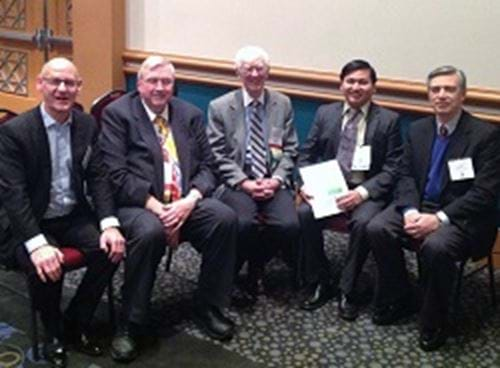Nexus solutions for a green economy
9th November 2015

The Institution of Chemical Engineers (IChemE) has called upon governments, funding agencies and manufacturing industry to support concrete initiatives to address the challenges presented by the water, energy, food security ‘Nexus’ in a coherent and sustainable manner.
The production of water, energy and food is intrinsically linked, and more joined up thinking is required in order to cope with increasing demand – particularly as the global population is expected to exceed nine billion by 20501.
The ‘Nexus’ approach, which was first developed by the Stockholm Environmental Institute in 20112, can support the transition to sustainability, by reducing trade-offs and generating additional benefits that outweigh transaction costs associated with stronger integration across sectors.
IChemE’s latest Green Paper, Getting to grips with the water-energy-food Nexus, examines the role that chemical engineers play in delivering sustainable solutions across the water-energy-food Nexus.
Chemical engineering embraces a systems-thinking approach that can deliver practical solutions to water-energy-food Nexus challenges through the application of robust life cycle analysis (LCA); cross boundary working; and thinking globally but acting locally.
The Green Paper was launched yesterday by Dr Elias Martinez Hernandez from the University of Oxford, UK, at the 2015 American Institute of Chemical Engineers (AIChE) Annual Meeting in Salt Lake City, US.
The paper was presented at a special World Café session on the Nexus organised under the auspices of the World Chemical Engineering Council (WCEC) with contributions from IChemE and AIChE.
Speaking from Salt Lake City IChemE’s director of policy, Andy Furlong, said: “Chemical engineers recognise the importance of considering all three components of the Nexus – water, energy and food – together, when devising integrated solutions for a more sustainable future. This new Green Paper provides a concise summary of Nexus thinking and it’s an ideal starting point for anyone seeking to understand the concept.”
Furlong went on to say: “We are confronted by a multi-pronged dilemma that includes population growth, increasing urbanisation, the need to improve living standards and climate change. The situation its multiplex and any solution to the world’s water, energy and food challenges must be based on an holistic, integrated perspective across the Nexus if we are to avoid damaging outcomes and unintended consequences.”
“Governments, funding agencies, manufacturers and regulators need to recognise the importance of the Nexus approach when making decisions on resource efficiency and sustainability. We must work together to ensure a safer and more efficient use of resources across the Nexus,” he concluded.
IChemE’s recommendations and conclusions:
- Greater investment is required from funding agencies for systems thinking Nexus research. Stronger collaboration between disciplines is imperative.
- Governments must work together to solve this problem by developing international platforms to promote Nexus-thinking through the circular economy and other novel solutions.
- The role of the Nexus in the new United Nations (UN) 17 Sustainable Development Goals needs to be explored, and the consequences for policy and commercial activity clarified.
- Operating companies and manufacturers should refrain from making decisions on sustainability and efficiency until they have studied their impact on the water-energy-food Nexus.
- Industry should publicise case studies of effective, good practices chemical engineering solutions to Nexus challenges.
- New tools are required for investigation the interconnectedness of the Nexus at different scales, and developing solutions to Nexus challenges.
- Better understanding is required of the trade-offs between Nexus security and ecosystem health.